Book I, Chapter 9: The Séance
List of Chapters | Previous Chapter
He dreamed it was evening and he was walking behind Oma Ingrid over the wooden bridge that spanned the river Inn. The villagers of Mariahilf had called her Mother Ingrid out of affection and respect. Hermann was a man now but his grandmother looked as she had the day she was murdered.
When she reached the other bank, she thrust something down deep into the dirt and walked on. Hermann didn’t know what it was until he reached the end of the bridge and saw that it was the split-flanged iron stake that had been driven through her heart on the morning she was buried at the crossroads.
Oma Ingrid passed the haunted toll house, which had not yet been demolished. She took the muddy path into the woods, and Hermann’s children, Frank and Charlotte, emerged from the toll house and ran after her.
The only sound Hermann could hear was the beating of his heart and the hearts of his children.
He followed at a leisurely pace and felt dread, but also a sense of nostalgia. He missed the Tyrol and the brisk air of the mountains. He had not been back to Austria since he and his father left so long ago.
At the crossroads, the signpost was gone; and in its place rose a majestic two-story chalet with white trim and delicate tracery. Oma Ingrid ascended the steps to the front door. She tore a piece from the porch and ate it to prove that the house was safe, because it was made of gingerbread.
Charlotte turned around and looked at Hermann. Frank could not see his father in the dream. Hermann urged his daughter to follow Oma inside. Then all three of them stood in the house.
There was a long table, at the end of which sat a creature with a face that looked like a cross between a wolf and wild boar. It held gobbets of flesh, which it tossed to Hermann’s mother, Ilse, who crouched in a corner with the wolves, which were part of her.
“It’s burning,” Oma Ingrid said. She opened a cast-iron oven that stood high off the ground so she could not be pushed into it.
“What’s burning?” the cannibal of Mariahilf am Inn asked. “My soul?”
“No,” Oma frowned as thick smoke billowed out of the oven and discovered a charred cradle. “The baby.”
Hermann tried to scream but had no voice. The cannibal placed his hands on either side of his face and lifted his head up and off his shoulders because his head had been a Carnival mask all along. The face beneath was pale, smooth and white. And its mouth was the mouth of an infant. The chin began to descend until its jaws had sunk beneath the table. Then it vomited a black mist that drenched the children in blood and rain.
And Frank and Charlotte danced and laughed, because they had been redeemed.
—A knock at the door.
Hermann and Henrietta sat up in bed.
“Who’s there?” Hermann asked.
Charlotte opened the door. Frank stood behind her.
“Papa,” Charlotte said. We’ve had a nightmare. They ran inside and climbed onto the bed, which had been Ludwig’s when he lived in the mansion.
“You two. . . ” Henriette lamented. “This bed is small. It’s going to crack.”
Erika began to cry from the crib. Henrietta sighed and threw back the bedcovers. “You’ve woken your sister.”
The children did not respond. Hermann felt their fingers digging into his skin. They were trembling.
On the evening of Holy Wednesday, 1867, Berthold Landecker presided over the supper table. The family had broken the Lenten fast with a salad, wheat cakes, and a dessert of cream poured over crushed ice.
Imogene’s granddaughter, Evangeline, entered the dining room. “Monsieur, the American named Martin is in the hall.”
“What? Oskar’s relation?”
“Oui.”
Berthold threw his napkin on his knee. “I don’t like that man. Mincing and unctuous. I wouldn’t be surprised if he’s come to the Continent to avoid some entanglement he got himself caught up in during this last secession war of theirs.”
“Their only secession war, my dear,” Ursula observed. “The first was a revolution.”
“More like an insurrection.” He addressed Evangeline. “What does he want?”
“He’s here to see Monsieur Tischler.”
“What?” Henrietta asked. “Why?”
“I asked him to come.” Hermann rose from the table. “We won’t disturb you. We’re going into the valley to examine Karl’s cabin.”
Berthold shook his head and looked at Ursula. “Charlotte, would you be so kind as to divert us with a reading of the Sermon on the Mount in the drawing room?”
“As you wish, Opa.”
The family exited the dining room and found Marty P. Fitzsimmons in the hall. He raised his top hat and bowed low. “Guten Abend, meine Damen und Herren . . .”
The children returned the greeting, but Berthold, Ursula and Henrietta continued into the drawing room without so much as looking at him.
Hermann grabbed a kit-bag on the table by the stairs.
“Come on,” he said, tugging Marty’s sleeve.
The two men passed through the dining room into the kitchen, where they surprised Imogene who was cleaning up the dinner things. They exited through the tiled pump room at the back of the mansion. The wheelwright factory lay quiet beneath them in the valley, though wisps of smoke still rose from the tall brick chimneys.
King Wilhelm I had issued a proclamation in March directing industries along the Mosel and Rhine to keep their factories open on a continual basis in preparation for an anticipated invasion of the Principality of Luxembourg. Berthold Landecker submitted an appeal through his solicitor Oskar, stating that his faith and conscience would not permit him to compel his Christian and Jewish laborers to violate God’s covenant by working on days sacred to them. An exemption was quietly granted.
When they reached the bottom of the steps, they headed to the groundskeeper’s cabin by the light of the moon. The mean hovel was stinking and cluttered and had not been opened since that dreadful night. There was a table and two chairs in the middle of the room.
“We should’ve brought a lantern,” Marty observed.
Hermann placed the kit-bag on the table and opened it. “I can see well enough to strike a match.”
He removed a candle and matchbox. Within seconds the table and chairs were awash in the dim light.
“Where are the items I asked you to bring?”
Hermann removed the memento mori his father had made, along with Moritz’s straight razor and shaving mirror.
“We won’t need the mirror,” Marty observed.
“Why?”
“The dead don’t like looking-glasses.”
Hermann put it back in the bag, as Marty set the wooden statue and razor on either side of the candle dish.
“What are we doing?”
“We’re going to hold what’s called a séance, so that I can invite your father in. That’s why I asked you to bring these items. They will facilitate the opening of the door.”
Hermann looked over his shoulder. “I don’t know about this. . . It feels like witchcraft.”
Marty sighed and pulled the chair out from the table. “Then why did you ask me to come?”
“I thought you could help.”
The medium sat down and removed his green gloves. “If you want me to help, you’ll need to take a seat and give me your hands.”
Hermann sat down and started to pray.
Marty waited with his arms outstretched on the table. “Anytime you see fit. . . ”
When Hermann had finished, he crossed himself. Then he put his hands on Marty’s upturned palms, but drew them away.
“What’s wrong?”
“I’m not used to a man touching my hands like a woman.”
“I thought I was the mind reader,” Marty quipped in English.
“I don’t speak English.”
“I know. . . Look, we have to make a physical connection if you want your father to speak through me.”
Hermann narrowed his eyes and clasped the medium’s hands again.
Marty closed his eyes and the two sat in silence for a full minute. “Is the spirit of Moritz Tischler with us now? If so, rap three times on the table.”
There was no sound. Not even a breeze outside.
“If you’re here, Moritz Tischler, speak. . . ”
The candle on the table flickered.
Hermann sighed. “Nothing’s happening.”
“It doesn’t just hap—” Marty gasped and his eyes reflected the candlelight, like the eyes of a wolf.
Hermann’s breath was knocked out of him and he was thrown back in the chair. He swooned and had a strange vision.
—He was a boy and stood before the gibbet of the condemned cannibal of Mariahilf am Inn, who was speaking in his mother’s voice: “Little boy, little boy, remember what I told you. . .”
—“The Cronenberg Tar and Creosote Factory,” the justice of the peace said, “where the convicts and anonymous dead are dumped. . . ”
—“I am legion,” Professor Hertz told him, quoting scripture. “For we are many. . . ”
—“Fight it, boy, and never lose hope.” It was his father’s voice, but his father had never said this to him.
Hermann opened his eyes and saw blood trickling from Marty’s nostrils. The medium now spoke German in the voice of Moritz Tischler: “I’m so sorry, son.”
Two leaden fists pounded the wall facing Moritz’s grave. Hermann turned and heard the scrabbling of claws on wood.
—THUNK!
Marty screamed.
When Hermann wheeled around, the American was holding his right hand with his left. The blade of the straight razor was open and sunk into the tabletop beside three twitching fingers. The candle blew out. And in the moonlight on the other side of the smudged window, a figure walked away.
Hermann yanked a cloth from a nearby peg and wrapped Marty’s hand in it. Then he slung the man’s arm over his shoulder and guided him out of the cabin across the field. He clenched his own right fist over the wound and kept urging Marty to try to keep quiet as they ascended the steps. They burst into the tiled pump room through the back door.
Imogene overheard and carried a candle into the room from the kitchen. She seemed unperturbed. Hermann told her not to raise an alarm. He asked her to bring a lantern and extra candles and prepare a hot iron so he could cauterize the wound.
Marty couldn’t understand everything but got the gist of the last part and whimpered “Aw, shit” in English.
Hermann eased him down into the same chair he had occupied on the morning the doctor bandaged his feet. The American yielded his right arm to Hermann and looked away, reaching for his pocket handkerchief with his free hand to wipe away the blood from his nostrils and upper lip.
Imogene brought towels, a wool pad, and a brown bottle of linseed oil.
“You’re fine,” Hermann said in a dull voice.
“I’m not fine. I’m about to faint.”
“Just don’t look at it.”
Imogene entered with a butcher knife whose blade was glowing white hot at the tip.
Marty’s eyes roved. “I can tell this is gonna hurt.”
She handed the blade to Hermann. Then she deftly twisted her fists around both ends of a cloth. She went behind the chair and told Marty to bite down on it. When he’d done this, she pulled his head back until he was pressed against her stomach. Hermann applied the blade to the bloody hand.
The American groaned and his legs shot out involuntarily, his feet scuffling on the floor tiles. He passed out and Hermann told Imogene to put water in the pail. She walked away and Hermann tucked Marty’s head under his chin to hold it in place so the man’s neck didn’t snap.
With the flesh cauterized and Marty still out, Hermann scrubbed the wound with the wool pad to get the grit out from under the skin. Then he leaned Marty’s head back against the chair and cleaned the wound with water.
This done, Hermann spat on his palm and mixed it with the linseed oil before rubbing it into the wound. This was something Oma Ingrid had taught him: The sputum of a Christian mixed with ointment helps prevent infection.
Hermann wrapped Marty’s hand in gauze. Imogene asked if he needed anything else because she was about to turn in for the night. Hermann said no and thanked her for her help.
Hermann slapped Marty’s face. The man moaned but didn’t wake up, so he slapped harder. “I’m awake. . .” (slap) “I said I’m awake. . .” (slap) “HALT!—God damn it!”
He sat up in the chair, shook his head and asked for a cup of water. Hermann filled a tin cup and brought it to him. He drank it off and asked for another.
“I’m not a doctor,” Hermann commented as he refilled the cup, “but I think I stopped the bleeding.”
Marty looked at the bandaged hand and nodded. “Well, I finally got a war wound I can brag about.”
“Did you fight in the American secession war?”
“No. I was deemed unfit.”
Hermann pulled off his shirt and undershirt because they were soaked in blood. He stepped outside and threw them in the rubbish bin. Then he came back in and worked the pump so he could clean himself off in the basin.
“Why were you deemed unfit?”
Marty looked away from the broad-shouldered back. “I don’t have the German vocabulary to explain why. . . Besides, it doesn’t matter.”
“Tomorrow I’ll go back down into the valley and fetch your fingers. Do you want me to bring them over to Oskar’s?”
“What in the Hell would I want my cut-off fingers for?”
“So you can be buried with them.”
“You Catholics are morbid.”
“You’re the one that talks to the dead.”
Marty laughed. “Touché!”
Hermann grinned, because he didn’t usually say things that people found funny. He went to the hamper under the back table and removed an unwashed nightshirt, which he slipped on. Then a thought came to him and he frowned.
“How’d you go so fast from being happy to being sad?”
“Because, my father is in Hell.”
“That wasn’t your father who attacked me. . . Didn’t you hear your father say, ‘Fight it, boy, and never lose hope’?”
“I didn’t know you heard that too.”
“Hermann, your father and grandmother are trying to keep the curse at bay. And it is a curse. It’s like nothing I’ve ever seen before. It’s a demon, a malevolent force, that is using what you remember of your loved ones to torment you. They’re in a gray misty place between Heaven and Hell. But with your help, maybe they’ll find peace. But I’m afraid your mother is lost forever.”
“I keep hearing my father’s voice telling me, ‘I’m so sorry, son.’ Is he apologizing for something he did long ago?”
Marty shook his head. “No, he’s saying he’s sorry because it’s too late to avert something terrible that’s about to happen.”
“What?”
“I don’t know. I can’t see into the future. If I could, I’d be a railroad tycoon.”
At sunrise Hermann put on a felt coat and canvas work gloves and headed downstairs.
Imogene was awake and mopping the floor in the pump room. Outside, he examined the cobblestones and the wooden steps that led down into the valley. The cobbles were dark and the steps had been stained, so the blood wasn’t visible unless you were looking for it.
The factory workers were arriving. They were taking the long zigzagging dirt path down through the woods about a quarter mile west of the mansion. Berthold Landecker did not want them cutting through the mansion’s grounds.
When Hermann reached the valley, he followed the path into the clearing to make sure nothing had happened to his father’s grave. A slab of concrete now covered it and the headstone stood intact. He walked to the cabin and touched the claw marks crisscrossing the split wood. There were neither footprints nor paw prints in the ground.
As he made it to the front he heard the grinding of metal. He turned and looked across the foggy yard. A group of men were moving around sheets of pig-iron in preparation for cutting wheel rims.
Four crows flew out of the cabin because the door had been left open last night. Hermann knew this meant the fingers were gone. He stepped inside and went to the table. He yanked his father’s straight razor out of the wood, folded it and put it back into the kit-bag. The memento mori was missing. He hadn’t even noticed that there were more crows in the cabin until he heard them cawing and flapping their wings.
Suddenly his nostrils were assailed by the putrid stench of decay. A half dozen crows were feasting on something gray and furry on the bed. Hermann stomped his feet and the birds flew out. He walked to the bed and saw it was the rotting carcass of a wolf. It couldn’t have been there last night or he would’ve smelled it, but he had to admit that the candlelight had been too dim to illuminate the bed. There are no wolves in this part of Germany, he thought. This is some kind of sick joke.
He was about to leave when an apprehension overcame him. Since the carcass was in such a state of decay, he was afraid the factory workers might come and investigate the stench and report what they’d found to the foreman, Maximilian, who would inevitably tell Berthold. Berthold knew Hermann and Marty had gone down into the valley last night to inspect Karl’s cabin. He’d told everyone at the dinner table.
This might reinforce Berthold’s mounting suspicion that his son-in-law was deranged. He might even suspect Hermann and Marty had engaged in some kind of witch’s sabbath. And, truth be told, Hermann still felt guilty about participating in the so-called séance.
There was nothing else to be done. He had to get rid of the carcass. He walked outside and took several deep breaths of the fresh morning air. Then he tied a handkerchief over his nose and went back in. He lifted the dead thing from the bed. The sheets clung to the sticky fur. He carried it to the door and had just stepped outside, when the wolf’s head reared back and snapped at him. “Jesus Christ!” he screamed and dropped it.
Two factory workers overheard the commotion and stepped outside. But by the time they crossed the foggy yard, the wolf had run off into the woods. And all they saw was Hermann Tischler, leaning forward with his hands on his knees, saying, “Jesus Christ!” over and over again.

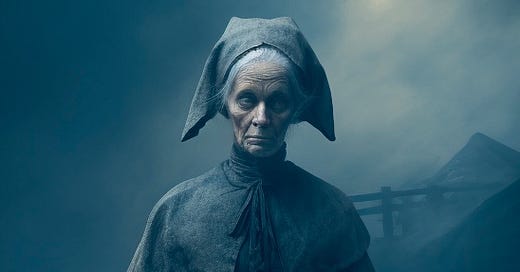



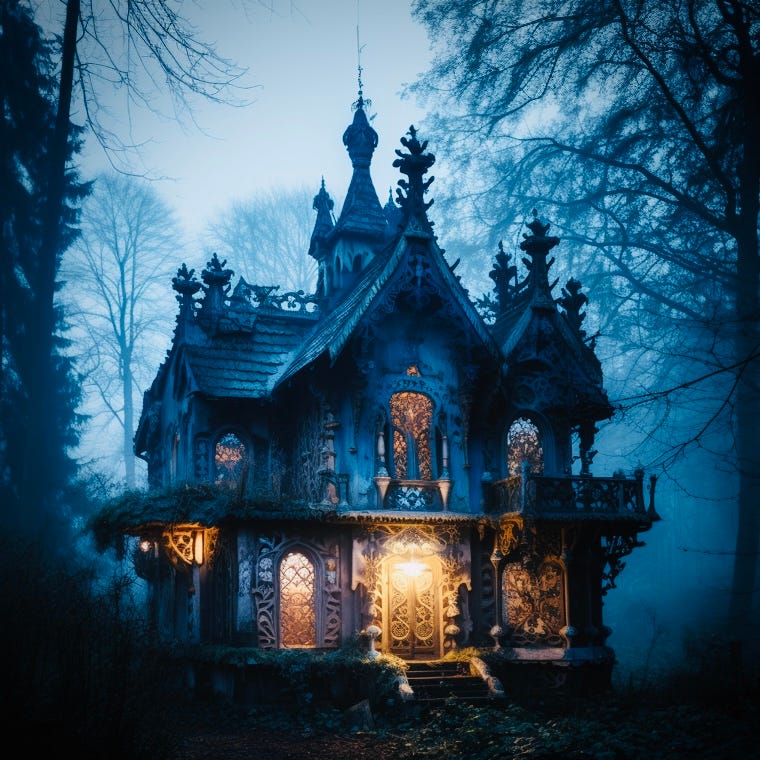
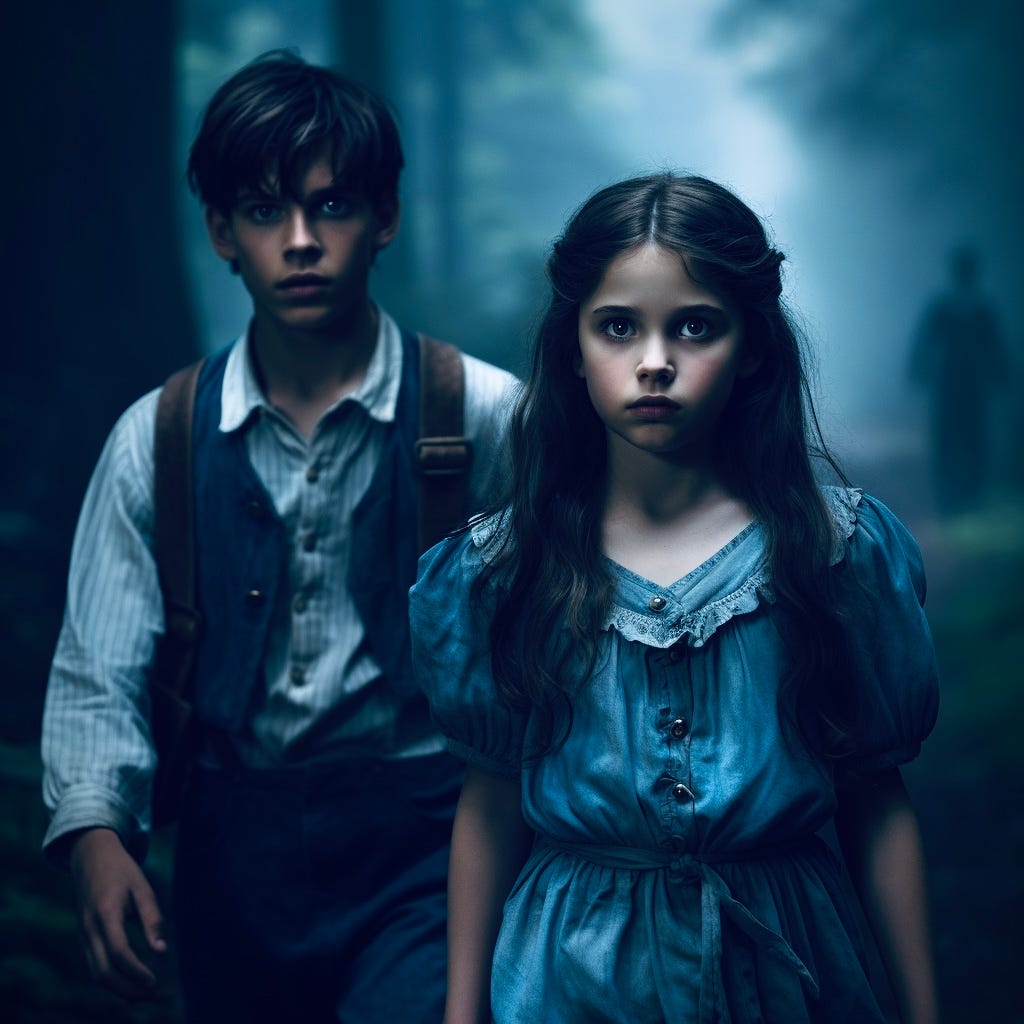
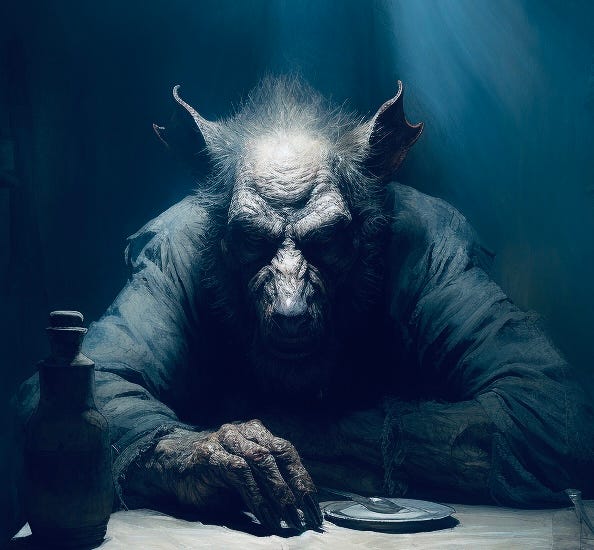



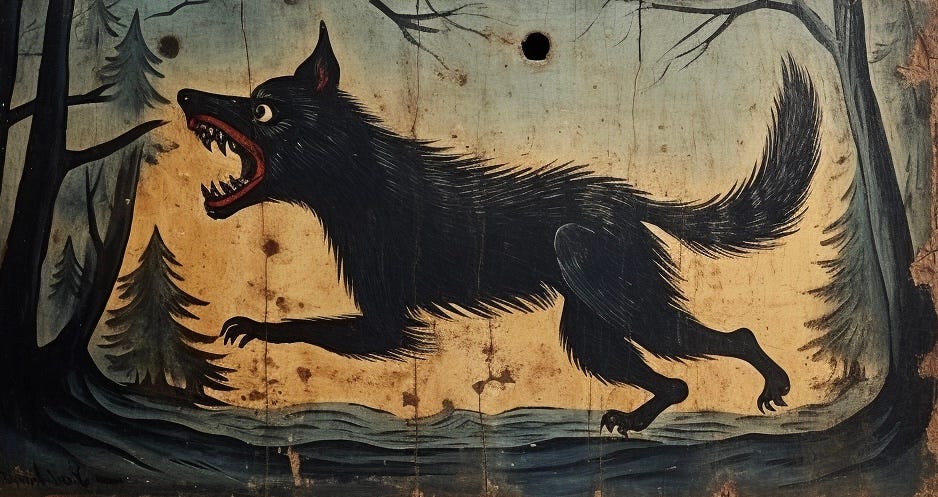
This would make one hell-ass spooky movie!!!
I couldn’t stop reading this chapter.